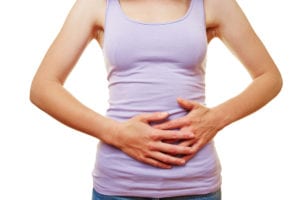Written by Chrystal Moulton, Staff Writer. Assessment of specific healthy lifestyle habits against the incidence of IBS showed that never smoking (P=0.02), optimal sleep (P=0.001), and vigorous physical activity (P=0.006) were significantly associated with lower risk of developing IBS.
 Irritable bowel syndrome [IBS] is a gastrointestinal disorder affecting 5-10% of the world population1. Individuals with this disorder generally experience abnormal stool frequency and form accompanied with abdominal pain2. Irritable bowel syndrome [IBS] is also associated with psychiatric illnesses as a comorbidity3,4. In this study, researchers evaluated lifestyle factors with the incidence of Irritable bowel syndrome [IBS]5.
Irritable bowel syndrome [IBS] is a gastrointestinal disorder affecting 5-10% of the world population1. Individuals with this disorder generally experience abnormal stool frequency and form accompanied with abdominal pain2. Irritable bowel syndrome [IBS] is also associated with psychiatric illnesses as a comorbidity3,4. In this study, researchers evaluated lifestyle factors with the incidence of Irritable bowel syndrome [IBS]5.
This prospective cohort study recruited participants between the ages 37 and 73 years old between 2006 and 2010. Participants provided biological samples while completing computerized questionnaires, 24h dietary recall assessment (2 non-consecutive days), and an interview regarding health, lifestyle, and demographics. Participants also underwent a physical examination. The five healthy lifestyle factors evaluated during this study were: physical activity, high dietary quality, optimal sleep, and never smoking. Eligible participants were categorized by the number of healthy lifestyle factors they had as follows:
- 0 indicated no healthy lifestyle factors applied to daily life
- 1 indicated only 1 healthy lifestyle factors applied to daily life
- 2 indicated 2 healthy lifestyle factors applied to daily life
- 3-5 indicated 3 to 5 healthy lifestyle factors applied to daily life
Incidence of IBS was assessed using information from hospital and medical records along with self-reported Incidence of the condition which were all obtained from the UK Biobank. Hazard ratio was calculated to measure correlation between healthy lifestyle factors and incidence of IBS. Sensitivity analysis was conducted based on sex, age, location, employment status, endometriosis, and GI infection.
This study ended in February 2022. Of the 502,492 participants recruited for the study, data from 64,268 was eligible for this assessment. The average age of participants was 55.9 years old, 55% were women (35,342), and the average BMI was 26.5 kg/m2. The number of people in each group was as follows:
- 0 lifestyle factors n= 7,604
- 1 lifestyle factors n= 20,662
- 2 lifestyle factors n= 21,901
- 3-5 lifestyle factors n= 14,101
The incidence of IBS was 1.5% (961 cases). Average follow-up was 12.6 years. After adjusting for employment status, age, sex, GI infection, endometriosis, and location, researchers found that adhering to 1 or more healthy lifestyle activities significantly reduced the incidence of IBS (p<0.001). Individuals who applied multiple healthy lifestyle factors had significantly lower risk of IBS. Furthermore, individual assessment of specific healthy lifestyle factors against the incidence of IBS showed that never smoking (P=0.02), optimal sleep (P=0.001), and vigorous physical activity (P=0.006) were significantly associated with lower risk of developing IBS. See Table 1 for details.
TABLE 1. Hazard ratio assessment of lifestyle factors and incidence of IBS
| No. of Healthy lifestyle factors | 0 | 1 | 2 | 3-5 |
| No. of participants | 7604 | 20662 | 21901 | 14101 |
| Hazard ratio (adjusted) | 1 | 0.79 (p< 0.001) | 0.64 (p< 0.001) | 0.58 (p< 0.001) |
| Specific Healthy Lifestyle Factors Associated w/ Low Risk of IBS | ||||
| Hazard Ratio (adjusted) | P-Value | |||
| Optimal sleep | 0.73 (0.60 – 0.88) | 0.001 | ||
| Vigorous physical activity | 0.83 (0.73 – 0.95) | 0.006 | ||
| Never smoking | 0.86 (0.76 – 0.98) | 0.02 | ||
| 3-5 healthy lifestyle factors | 0.58 (0.46 – 0.72) | <0.001 | ||
Overall, results showed that healthy lifestyle factors including optimal sleep, never smoking, and vigorous physical activity is associated with a reduced risk of IBS. Also, the more healthy lifestyle factors applied, the lower ones risk of developing IBS. Findings in this study agree with a previous trial conducted in Iran6. Additional research will be needed to clarify other risk factors that could affect one’s risk of developing IBS.
Source: Ho, Fai Fai, Hui Sun, Hong Zheng, David CN Wong, Yin-Yan Gao, Chen Mao, Yin Ting Cheung et al. “Association of healthy lifestyle behaviours with incident irritable bowel syndrome: a large population-based prospective cohort study.” Gut (2024).
© Author(s) (or their employer(s)) 2024. No commercial re-use. See rights and permissions. Published by BMJ.
Click here to read the full text study.
Posted March 27, 2024.
Chrystal Moulton BA, PMP, is a 2008 graduate of the University of Illinois at Chicago. She graduated with a bachelor’s in psychology with a focus on premedical studies and is a licensed project manager. She currently resides in Indianapolis, IN.
References:
- Sperber AD, Dumitrascu D, Fukudo S, et al. The global prevalence of IBS in adults remains elusive due to the heterogeneity of studies: a Rome Foundation working team literature review. Gut. Jun 2017;66(6):1075-1082. doi:10.1136/gutjnl-2015-311240
- Mearin F, Lacy BE, Chang L, et al. Bowel Disorders. Gastroenterology. Feb 18 2016;doi:10.1053/j.gastro.2016.02.031
- Drossman DA, Camilleri M, Mayer EA, Whitehead WE. AGA technical review on irritable bowel syndrome. Gastroenterology. Dec 2002;123(6):2108-31. doi:10.1053/gast.2002.37095
- Miller V, Hopkins L, Whorwell PJ. Suicidal ideation in patients with irritable bowel syndrome. Clinical gastroenterology and hepatology : the official clinical practice journal of the American Gastroenterological Association. Dec 2004;2(12):1064-8. doi:10.1016/s1542-3565(04)00545-2
- Ho FF, Sun H, Zheng H, et al. Association of healthy lifestyle behaviours with incident irritable bowel syndrome: a large population-based prospective cohort study. Gut. Feb 20 2024;doi:10.1136/gutjnl-2023-331254
- Hajishafiee M, Keshteli AH, Saneei P, Feinle-Bisset C, Esmaillzadeh A, Adibi P. Healthy lifestyle score and irritable bowel syndrome: A cross-sectional study in adults. Neurogastroenterology and motility : the official journal of the European Gastrointestinal Motility Society. May 2020;32(5):e13793. doi:10.1111/nmo.13793
